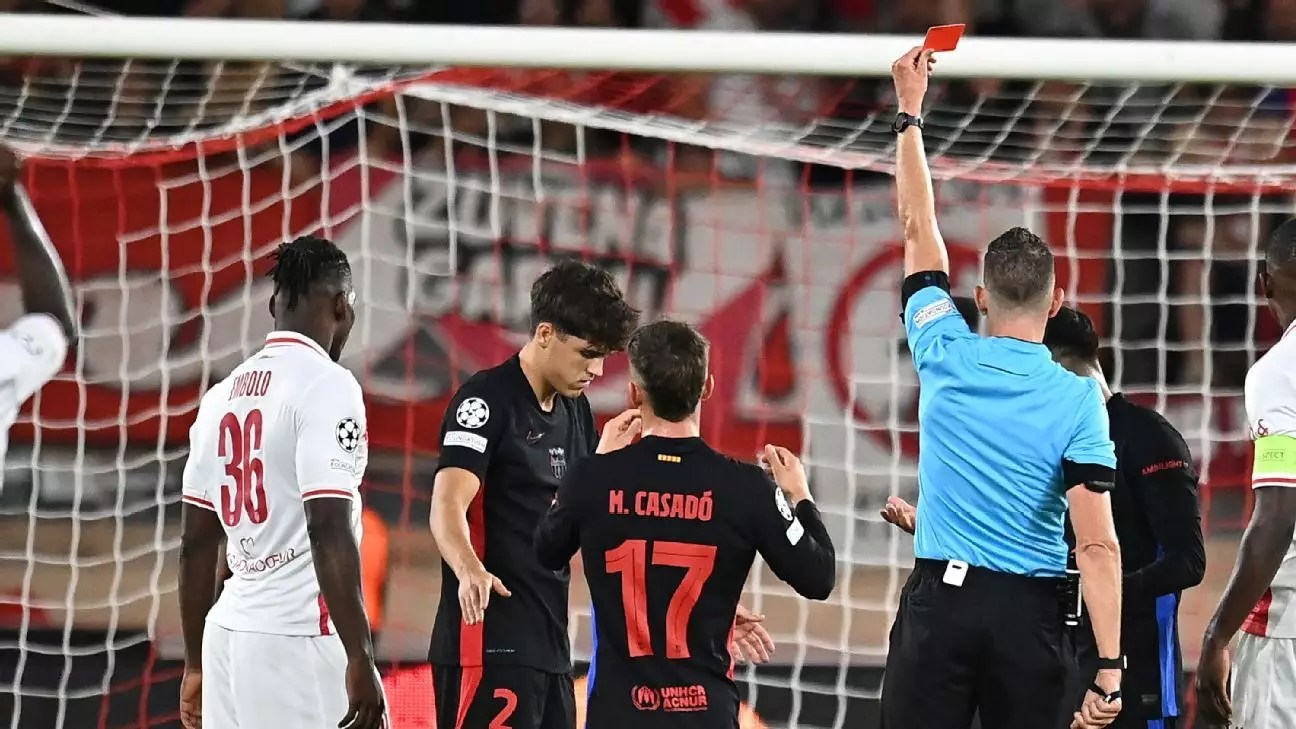Barcelona’s enduring quest for glory met an unexpected bump during their encounter with Monaco, culminating in a 2-1 defeat that has set the stage for a poignant examination of the team’s potential and challenges under the stewardship of coach Hansi Flick. The early red card shown to Eric García after merely ten minutes significantly transformed the match dynamics, forcing the Catalan giants to adapt on the fly. It marked a disheartening first loss for Flick, but deeper reflections reveal how this event intertwines within broader themes of resilience and strategy in European football.
The pivotal moment of contention arose when García fouled Takumi Minamino, leaving Barcelona to navigate an arduous 80 minutes with ten men. This early dismissal was not just a moment of reckless decision; it was a catalyst that rattled the foundations of Barcelona’s tactical framework. Flick’s initial strategic outline crumbled, preventing the team from implementing their desired style of pressing and ball control. Such a misstep highlights a more extensive vulnerability in teams when faced with crucial moments, illustrating how a single decision can sway the outcome dramatically.
Despite the red card’s immediate implications, Barcelona demonstrated resilience, managing to level through Lamine Yamal’s goal that exhibited a flicker of their attacking prowess. However, the subsequent quick-response goal by Monaco’s Maghnes Akliouche underlined the struggles that arise when a team is forced to adjust not just tactically but also in spirit. This reality is emblematic of modern football, where high-stakes decisions often determine the course of a match.
Flick reflected on the challenges after the match, stating, “After the red card, the game changed totally.” His concern highlights an ongoing debate about the sustainability of defensive strategies when the odds are stacked against a team. Despite the logistical and psychological hurdles, Barcelona attempted to bolster their defense, showcasing a collective spirit. However, Monaco exploited the situation, proving that the influx of players with pace and skill could easily unravel even the most disciplined setups.
In the game’s final moments, Barcelona’s struggle persisted as they concentrated on damage control rather than executing their game plan. Flick has emphasized the need for unity in defense and offense, yet the disparity in players’ stamina and strategy when a team transitions to a more defensive posture cannot be overlooked.
Barcelona now stands at a crossroads in the group stages of the new Champions League format, with a variety of teams, including heavyweights like Bayern Munich and Borussia Dortmund, still on the horizon. The pressure mounts as they prepare for their upcoming clash with Young Boys, yet Flick remains confident about Barcelona’s prospects. He mentioned, “I think we are strong enough to play a good Champions League.” This assertion exudes a blend of optimism and pragmatism that perhaps can rally the players moving forward.
The new tournament structure, which delineates a pathway for the top teams while allowing for a secondary knockout phase, poses challenges as well as opportunities. The Catalan giants must harness their momentum, learning from their setbacks to ensure they emerge strong in subsequent encounters.
Among the silver linings in this tumultuous match was the return of Ansu Fati, whose re-entry into the squad presents a dual benefit: boosting the team’s attacking threat while also providing a seasoned perspective to younger players. Fati, renowned for being the youngest scorer in Champions League history, represents a beacon of hope for Barcelona’s resurgence and a fresh talent pool they can lean on. Flick acknowledges Fati’s development and asserts that his growing confidence will be invaluable as the team navigates this competitive season.
As a juxtaposition, the rising star of Lamine Yamal, barely 17, is already stepping into the spotlight, eliciting a palpable change in the way opponents approach their games against Barcelona. The dynamics introduced by both Yamal’s and Fati’s performances point towards a new chapter in Barcelona’s evolution, where youth plays a crucial role amid seasoned gameplay.
Barcelona’s defeat against Monaco embodies a crucial learning opportunity for Hansi Flick’s side. The early red card undoubtedly impacted their strategy and morale, yet it also galvanized discussions around their tactical adaptability and resilience. As the competition presses on, learning from these hurdles and fostering the talents within their ranks will be vital to ensuring a successful campaign ahead. Flick’s insistence on maintaining optimism amidst setbacks will be key as Barcelona strives to reclaim their stature in European football, reminding us all that the journey often holds as much weight as the destination.


Leave a Reply